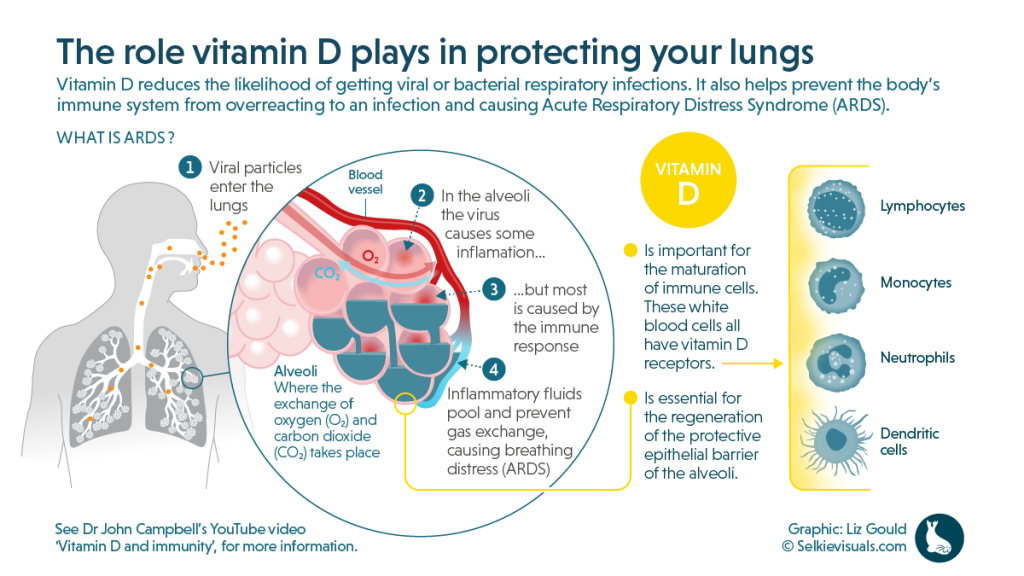Published on April 17, 2024
Meta-analysis including 43 randomized controlled trials finds significant benefits for COPD patients taking vitamin D supplements
Key Points
- A new study analyzed data from 43 randomized controlled trials (RCTs) to find that vitamin D supplementation significantly improved specific markers of lung function, while also decreasing the odds of acute exacerbations and improving T-cell levels
- Vitamin D acts to directly protect the lungs, from its effect on the protective barrier of the lungs, to its involvement in the maturation of immune cells, and its role in regulating the inflammatory response and inhibiting the cytokine storm; cellular models have demonstrated the direct effect of vitamin D deficiency on the tissues within the lungs, which include increased alveolar inflammation, lung epithelial damage, and hypoxia (the deprivation of oxygen to surrounding tissues)
- Omega-3 fatty acids also have an important role in maintaining lung health, underscoring the importance of including omega-3 fatty acids in the diet, especially given that many Americans do not meet current guidelines

Chronic obstructive pulmonary disease (COPD) is a group of chronic inflammatory lung diseases characterized by abnormalities in the airways and/or alveoli, causing blocked airflow and decreased lung function, and leading to symptoms such as difficulty breathing, shortness of breath, wheezing, chronic cough, and increased production of phlegm. The two conditions that contribute the most to COPD are emphysema and chronic bronchitis. COPD is the 3rd leading cause of death in the world.
Understanding COPD
The following video by Duke Health discusses the basics of COPD, including its causes, symptoms, and how it is diagnosed.
Meta-analysis Finds Vitamin D Beneficial for COPD Patients
A new study by Li et al. analyzed data from 43 randomized controlled trials (RCTs) to identify the impact of specific nutrients on lung function in COPD patients. Nutrients in the studies included vitamin D, vitamin C, vitamin E, magnesium, and nutrient complexes.
The study found that vitamin D supplementation significantly improved specific markers of lung function, including:
- FEV1%
- WMD
- FEV1/FVC%
Vitamin D supplementation was also found to:
- decrease the odds of acute exacerbations
- improve levels of T-cells (immune function)
Beneficial effects on lung function were also found among those supplementing with nutrient complexes, but not with vitamin C and E alone.
The authors of this study concluded,
“Vitamin D supplementation alone and multinutrient supplementation resulted in significant improvements in lung function and disease severity in patients with COPD.”
How Does Vitamin D Work to Improve Lung Function?
Vitamin D acts to directly protect the lungs, from its effect on the protective barrier of the lungs, to its involvement in the maturation of immune cells, and its role in regulating the inflammatory response and inhibiting the cytokine storm. Cellular models have demonstrated the direct effect of vitamin D deficiency on the tissues within the lungs, which include increased alveolar inflammation, lung epithelial damage, and hypoxia (the deprivation of oxygen to surrounding tissues). This helps explain why vitamin D deficiency has been associated with an increased risk of developing pneumonia, Acute Respiratory Distress Syndrome (ARDS, aka wet lung), and sepsis, and why correcting vitamin D deficiency may help prevent damage to the lungs, such as when addressed prior to procedures of the upper respiratory tract such as oesophagectomy (surgery to the esophagus).
The graphic below illustrates what happens in the lungs during ARDS, in which the air sacs of the lungs fill with fluid, preventing the uptake of oxygen. The condition leads to shortness of breath and difficulty breathing, and in severe cases, can lead to sepsis and/or death. Vitamin D helps to modulate inflammation and over-reaction of the immune response, therefore reducing the risk.
Make Sure You Are Getting Enough Vitamin D, Omega-3s, and Magnesium for Lung and Immune Function!
 Having and maintaining healthy vitamin D levels and other nutrient levels can help improve your health now and for your future. Choose which additional nutrients to measure, such as your omega-3s and essential minerals including magnesium and zinc, by creating your custom home test kit today. Take steps to improve the status of each of these measurements to benefit your overall health. With measurement you can then determine how much is needed and steps to achieve your goals. You can also track your own intakes, symptoms and results to see what works best for YOU.
Having and maintaining healthy vitamin D levels and other nutrient levels can help improve your health now and for your future. Choose which additional nutrients to measure, such as your omega-3s and essential minerals including magnesium and zinc, by creating your custom home test kit today. Take steps to improve the status of each of these measurements to benefit your overall health. With measurement you can then determine how much is needed and steps to achieve your goals. You can also track your own intakes, symptoms and results to see what works best for YOU.
Enroll in D*action and Test Your Levels Today!






